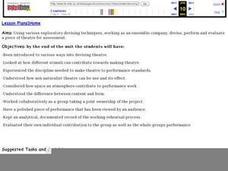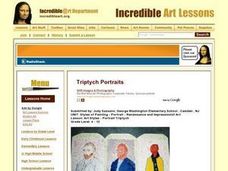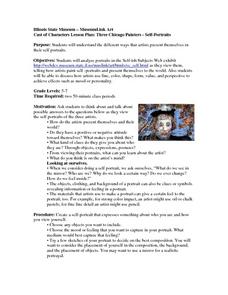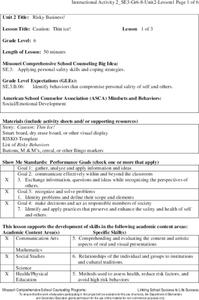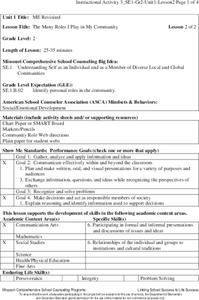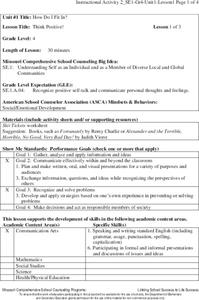Curated OER
Isn't It Romantic?
Sixth graders investigate the ideas, literature, music, and art of the Romantic Movement. They apply romantic ideals to their original writing and art, analyze poetry, discuss key vocabulary, and analyze artwork from this era.
Curated OER
A Bug's Journey
Students research the art of John Baldessari. In this art history lesson, students examine Baldessari's drawing of a beetle and discuss the characteristics of these bugs. They write a story from a bug's perspective and create their own...
Curated OER
Breaking the Chains, Rising Out of Circumstances
Students investigate a sculpture from the 17th century. In this art history lesson, students examine Bust of a Man by Francis Hardwood and discover the meaning behind it. Students create their own portrait bust of somebody they admire.
Curated OER
Virtual Art Tours
Students take a virtual field trip of Canadian art. They identify aspects of selected images that indicate the social, historical, or cultural context in which they were created. They compare the distinctive styles of artists from...
Curated OER
The Art of Making Letters
Students explore letter formation through art. They analyze and discuss Jasper Johns letter paintings, and create the letter strokes using various colors and torn paper.
Curated OER
Mood In Art And Poetry
Seventh graders investigate the concept of mood and how it influences various types of art. They create an abstract painting and demonstrate how mood is present in the work. Also, 7th graders construct poems using word choices to set...
Little Bit Studio
Bugs and Buttons 2
Playing with bugs and buttons has never been so much fun! Offering a variety of different activities, this is a great resource for developing basic skills in preschool and kindergarten-aged children.
Curated OER
Theatre: Exploratory Techniques
Using various exploratory techniques, young actors work as an ensemble company to devise, perform and evaluate a piece of theatre for assessment. This outline provides an objective and a list of games and activities that stimulate skills...
Curated OER
Art Styles - Portrait Triptych
Students select one photos and creates portraits of the photo in three different styles. After making the portraits, they describe the differences between them. They place their finished product on a triptych for viewing and practice...
Curated OER
Three Chicago Painters: Self-Portraits
Learners examine self-portraits on a Website. They create self-portraits which reveal something about themselves. They include objects which give clues to Students' personalities. The portraits are displayed in the school.
Curated OER
Technology: Self-Portraits
Students use Kid Pix to create self-portraits. Using mirrors, they create accurate renditions of themselves on the computer. They print the portraits and display them in the classroom.
Curated OER
Art of Mexico - Painting
Young scholars create a personal painting of thanks, explain importance of devotional art in Mexico, and critically view art work from another culture. Next, students evaluate self and peer work.
Curated OER
Blurry to Sharp Art
Students explore shading different levels of tone and value using Painter 7 or Painter Classic. Students blur a selected, scanned image twice and draw the blurriest image using shades of gray and black. They draw the other blurred image...
Curated OER
You Have Egg On Your Face
Students explore and analyze how the human face is proportioned and explore ways artists use mathematics to make art. They demonstrate the basic face proportions by creating a reference sketch and illustrating visual clues to communicate...
Missouri Department of Elementary
What Color is Your Apple?
Build your classroom community with an activity that uses apples to examine oneself and their classmates. Participants draw four large apples on blank paper then exchange them within a small group. Group members write a character trait...
Missouri Department of Elementary
Fly Your Kite
Encourage scholars to become a productive community member with a kite-themed lesson. Following a review and discussion, learners complete a Venn diagram that displays the connection between character traits needed to make a home and...
Museum of Tolerance
Quilt Activity
After completing the first five lessons from the series, scholars assemble their quilt pieces to create a family history quilt. They then rate their experience of learning about their families by conducting interviews, creating family...
Missouri Department of Elementary
Caution: Thin Ice!
Sixth graders listen to a story titled "Thin Ice!" then partake in a whole-class discussion asking and answering questions about what was read. Scholars brainstorm risky behaviors in preparation for a game of RISKO—a game similar to...
Missouri Department of Elementary
Character Clovers
Build a classroom community with a lesson that uses character clovers to examine scholars' roles. Following a whole-class discussion, participants list four roles they play and accompany it with the character traits that go along with it.
Missouri Department of Elementary
The Many Roles I Play in My Community
Small groups brainstorm their roles in the community. Then, individually, complete a community roles web worksheet. Peers share their completed product and extend the conversation to include the feelings and character traits that go...
Missouri Department of Elementary
Goldilocks Revisited
After a read-aloud of the story Goldielocks and the Three Bears, scholars gather into small groups to answer a series of questions. Peers examine the idea of smart decisions and identify three feelings of characters alongside three...
Missouri Department of Elementary
Think Positive!
Following an attention-grabbing read-aloud, scholars brainstorm ways they can change negative thoughts into positive thoughts. Small groups plan and perform a skit that showcases one of the new ideas to uplift one's feelings....
Missouri Department of Elementary
Feeling Faces
A lesson help scholars identify emotions through facial expressions. After a friendly puppet reads scholars a poem all about feelings, learners act out how they would feel when a specific action happens to them. Participants watch and...
Hawaiʻi State Department of Education
Exploring Environments
Different animals live in distinct and specialized environments. Learners will discuss organisms and environments, and then create some using their dramatic art skills. They all act like animals in a marine environment. When they are...









